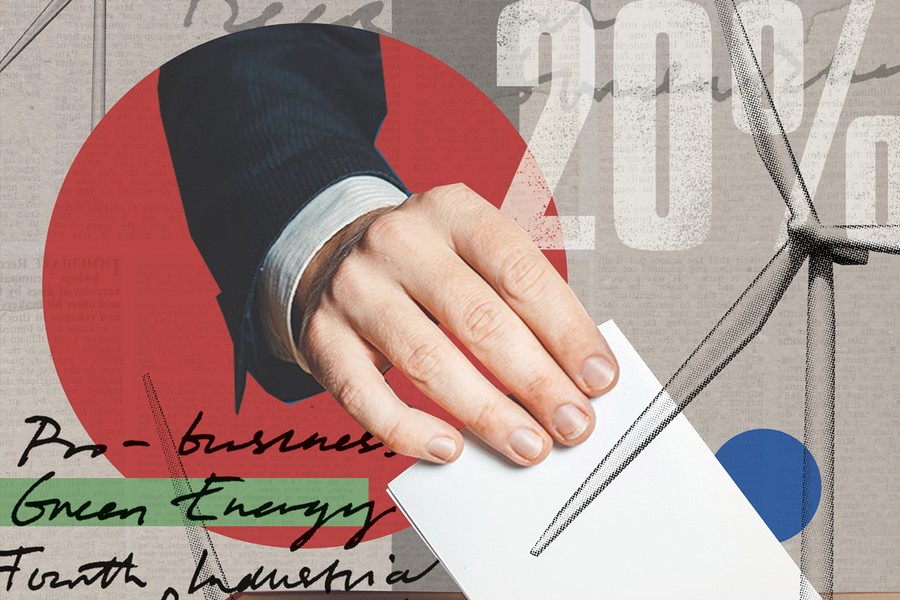Keir Starmer’s Labour is a different beast from the party that was led to defeat in 2019 by Jeremy Corbyn. For a start, the opposition frontbench has made engagement with business a priority.
Rachel Reeves is an impressive former Bank of England economist and a convincing Chancellor-in-waiting – even George Osborne thinks so, and Jonathan Reynolds is a popular Shadow Business Secretary who has been building relationships with industry and happily agrees that he is on a "prawn cocktail charm offensive" with business.
Energy will be at the heart of every manifesto.
In Keir Starmer’s recent speeches to business, he repeats the line that Labour is “not just a pro-business party but a party that is proud of being pro-business.” He talks about a potential Labour government working in partnership with business and trade unions in a deliberate echo of pro-industry Tony Blair. But we are light years away from Labour’s landslide victory in 1997 – and using the rhetoric of being pro-business is not enough on its own.
Covid and the economic lockdown of global economies, plus the impact of Brexit on Britain’s migrant labour, have seen our workforce shrink. The Conservative government’s answer is to find ways to tempt older workers off golf courses and cruise ships back into the office. Labour’s message to business is that they are open to making it easier for migrants to work in the UK but in return, industry must persuade them that they have longer-term plans to improve skills and pay for domestic workers.
Starmer believes that green energy will bring economic stability, higher skills and growth.
The most significant difference between now and 1997 is the war in Ukraine. Energy policy used to be largely left to data experts and engineers. Now it will be at the heart of every manifesto – especially Labour’s. Keir Starmer believes that green energy will bring economic stability, higher skills and growth, likening his plans for a publicly-owned Great British Energy generating company to EDF in France and Vattenfall in Sweden.
To pay for this, Labour has called for a windfall tax on the ‘excess’ profits of oil and gas companies. Not only that, the party has made clear that there would be no new licences for oil and gas fields in the North Sea. Instead, Great British Energy will provide more capacity alongside existing firms to help the UK produce 100% zero-carbon electricity by 2030 by investing in wind, solar, nuclear, hydrogen and carbon capture and storage.
This, of course, means vastly more infrastructure – an exponential expansion of the current power grid, more electricity substations, charging points for electric vehicles and a network of hydrogen refuelling stations. Labour also talks about insulating 19 million homes and a green skills training programme to create an army of heat pump engineers.
Keir Starmer says that he wants to prepare the UK workforce for the fourth industrial revolution, which will see not just the electrification but also the digitalisation of the economy.
Reforming the much-complained-about Apprenticeship Levy to make it more flexible and able to tailor to individuals’ and business needs will be popular, as will abolishing business rates to help town centre retail compete with online shopping giants. What will be a much greater challenge is to get the infrastructure built in time to deliver these ambitious proposals. Labour has announced the establishment of a new Industrial Strategy Council that will think through what needs to be built where and in what sequence.
Keir Starmer wants to prepare the UK for the fourth industrial revolution; not just the electrification but also the digitalisation of the economy.
These are big plans. Their success depends on the voting public. More skilled and well-paid jobs in what used to be Labour’s industrial heartlands will be welcomed; roads being dug up for electricity cables or more overhead pylons, less so. If the costs of insulating homes and fitting new electric heat pumps are not borne by the consumer, they might be persuaded to put up with the disruption. If they are out of pocket, it will be a harder sell.
There is a lot of detail to get right but even before that, Labour knows there is still a mountain to climb. The Conservatives may be unpopular, but that is not enough to hand the keys to Downing Street to Keir Starmer.
So for now, on their mission to persuade enough people to vote Labour at the next election, the party will be serving beer and sandwiches – as well as prawn cocktail.
The view from the floorInvestment Director Charles Bathurst-Norman shares his thoughts from an investment standpoint.
The battleground will inevitably be the strength of the economy. Thatcher quipped “Socialist governments traditionally do make a financial mess. They always run out of other people’s money.” Starmer is conscious of this and is backing a new business-friendly agenda with which Labour clearly intends to go to the polls. While Sunak can’t be accused of lacking big ideas, his five priorities look more like fire-fighting. By comparison, Starmer is on an electoral mission and has pledged to make the UK the fastest-growing economy in the G7.
The Labour leader’s pledge of a fossil-fuel free electricity system by 2030 did catch my eye. Although the UK is not significantly dependent on Russian oil and gas, we will be impacted by price surges and Starmer has made addressing this at the forefront of his manifesto. At the World Economic Forum in Davos, he reiterated the Labour Government would make the UK a net exporter of clean energy and block fresh investment in North Sea oil and gas. A faster rollout of renewable energy schemes to cut energy bills and deliver energy independence would be implemented via a new publicly owned Great British Energy company with the aim to hit the 2030 electricity target by quadrupling offshore wind capacity, accelerating the use of floating offshore wind farms, tripling solar power, doubling onshore wind capacity and expanding the use of hydrogen as an alternative energy source. Labour also envisage the completion of new nuclear power stations at Hinkley Point and Sizewell, as well as backing new “small modular reactors”. In my view, if Labour were to form the next government, exposure to these alternative investment themes should run keenly through the backbone of portfolios for long term investors.
Natascha Engel
Former Labour Member of Parliament and CEO of Palace Yard, a policy and research institute.
Illustration by Adam Mallett




